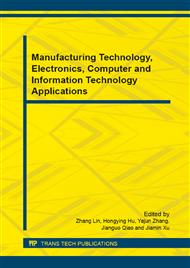p.353
p.359
p.363
p.367
p.371
p.375
p.378
p.382
p.386
Slide - Mode Variable Structure Adaptive Control of Electro-Hydraulic Servo Systems Based on LuGre Friction Model
Abstract:
Electro-hydraulic servo system has more disturbance and noise factors at low speed than in other situations of the whole operating process, so the stability and performances of the system would be greatly affected by these factors. It is generally accepted that nonlinear torque disturbance is the main interference factor. In order to compensate above disadvantages, a sliding mode variable structure control was proposed to adjust the electro-hydraulic servo system. The results indicate that the provided approach possesses satisfactory performances in stability, robustness, steady state error and so on.
Info:
Periodical:
Pages:
371-374
Citation:
Online since:
November 2014
Authors:
Price:
Сopyright:
© 2014 Trans Tech Publications Ltd. All Rights Reserved
Share:
Citation:


